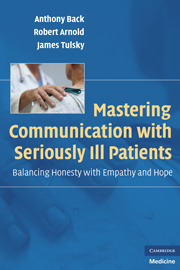Book contents
- Frontmatter
- Contents
- PREFACE
- 1 TAKING YOUR SKILLS TO THE NEXT LEVEL
- 2 GETTING A GOOD START
- 3 TALKING ABOUT SERIOUS NEWS
- 4 DISCUSSING EVIDENCE FOR MAKING TREATMENT DECISIONS
- 5 DISCUSSING PROGNOSIS
- 6 BETWEEN THE BIG EVENTS
- 7 CONDUCTING A FAMILY CONFERENCE
- 8 DEALING WITH CONFLICTS
- 9 TRANSITIONS TO END-OF-LIFE CARE
- 10 TALKING ABOUT DYING
- 11 CULTIVATING YOUR SKILLS
- APPENDIX A THE ROADMAPS IN OUTLINE FORM
- APPENDIX B ACKNOWLEDGMENTS
- INDEX
10 - TALKING ABOUT DYING
“Do not resuscitate” orders and goodbyes
Published online by Cambridge University Press: 23 November 2009
- Frontmatter
- Contents
- PREFACE
- 1 TAKING YOUR SKILLS TO THE NEXT LEVEL
- 2 GETTING A GOOD START
- 3 TALKING ABOUT SERIOUS NEWS
- 4 DISCUSSING EVIDENCE FOR MAKING TREATMENT DECISIONS
- 5 DISCUSSING PROGNOSIS
- 6 BETWEEN THE BIG EVENTS
- 7 CONDUCTING A FAMILY CONFERENCE
- 8 DEALING WITH CONFLICTS
- 9 TRANSITIONS TO END-OF-LIFE CARE
- 10 TALKING ABOUT DYING
- 11 CULTIVATING YOUR SKILLS
- APPENDIX A THE ROADMAPS IN OUTLINE FORM
- APPENDIX B ACKNOWLEDGMENTS
- INDEX
Summary
How you talk about dying makes a difference
Talking about dying can be one of the most frustrating communication tasks or, paradoxically, one of the most satisfying. The reasons for frustration are formidable: patients are “not ready,” “in denial,” or “unrealistic.” The reasons for deep satisfaction are equally impressive, in a different way. Physicians describe the experience of talking to dying patients as a “privilege,” “life-changing,” or “amazing.” What accounts for the divergence? Certainly, patients vary considerably in their willingness and capacity to talk about their own impending death. In addition, different cultures have different ways of talking about death. Yet, in our experience, the most powerful variable surrounding discussions of dying has to do with the physician rather than the patient. If you practice the roadmaps in this chapter, you could change your experience of talking about dying from chronically frustrating to commonly rewarding.
Why is talking about dying so tricky?
The two communication tasks in this chapter might be the most difficult, but for completely different reasons. While most physicians have lots of experience talking about resuscitation preferences (commonly called “talking about cardiopulmonary resuscitation [CPR]” or “do not resuscitate [DNR] orders”) with patients, many have never seen the roadmap we recommend. Furthermore, when it comes to saying goodbye to patients who are dying, many physicians have no experience at all. Certainly there is more to say about dying than we can cover in this chapter.
- Type
- Chapter
- Information
- Mastering Communication with Seriously Ill PatientsBalancing Honesty with Empathy and Hope, pp. 121 - 136Publisher: Cambridge University PressPrint publication year: 2009



